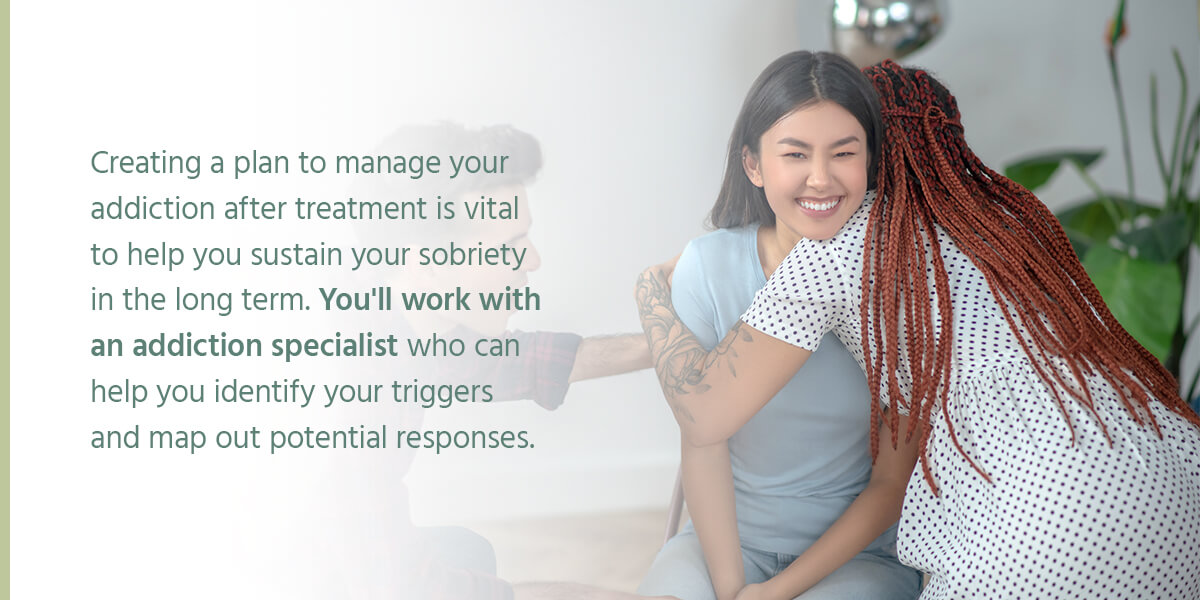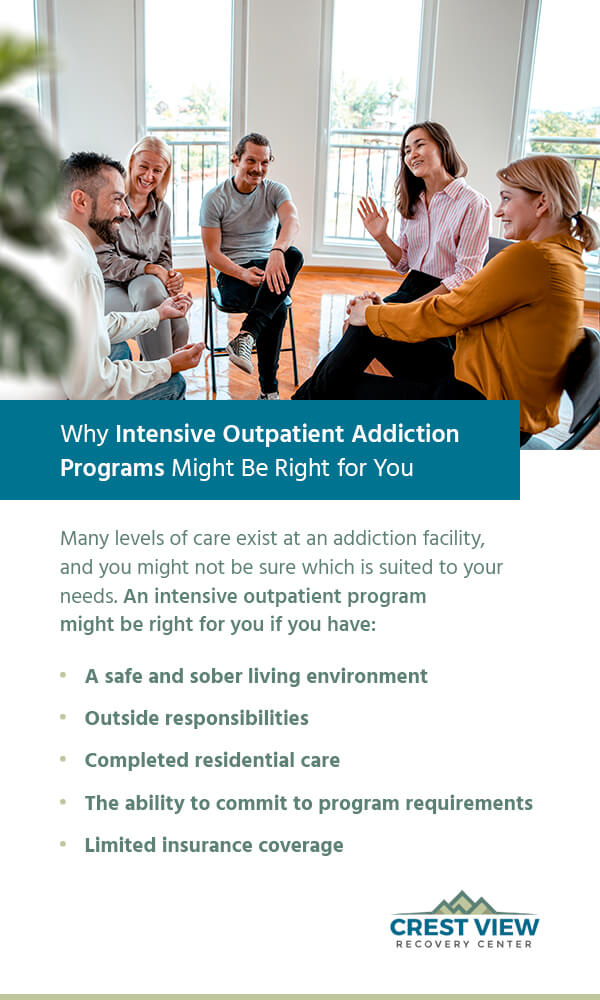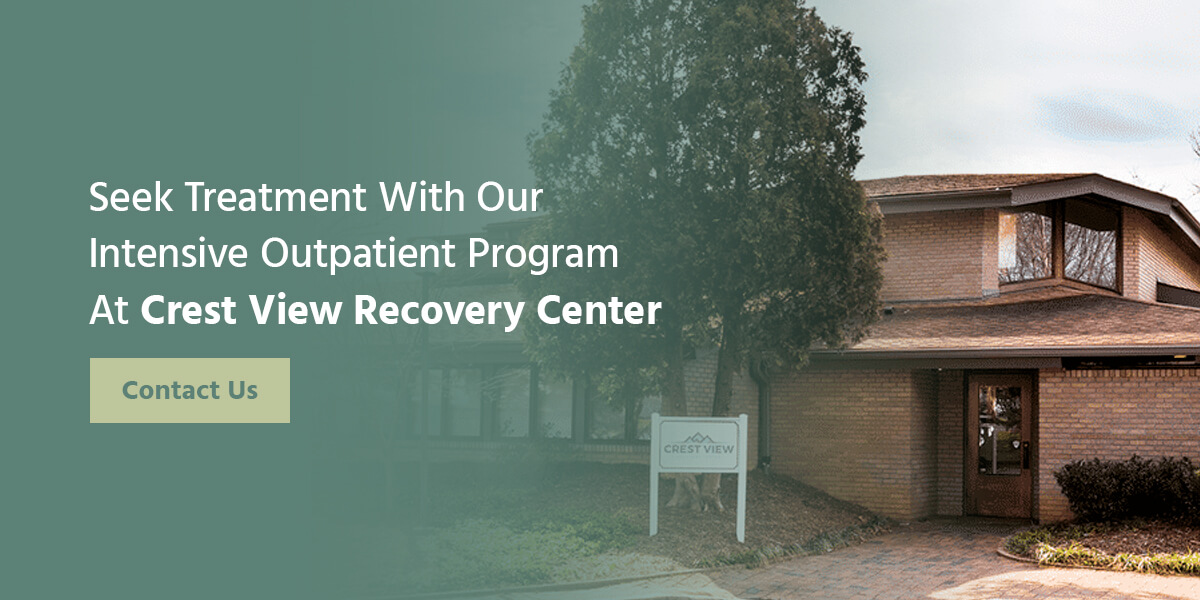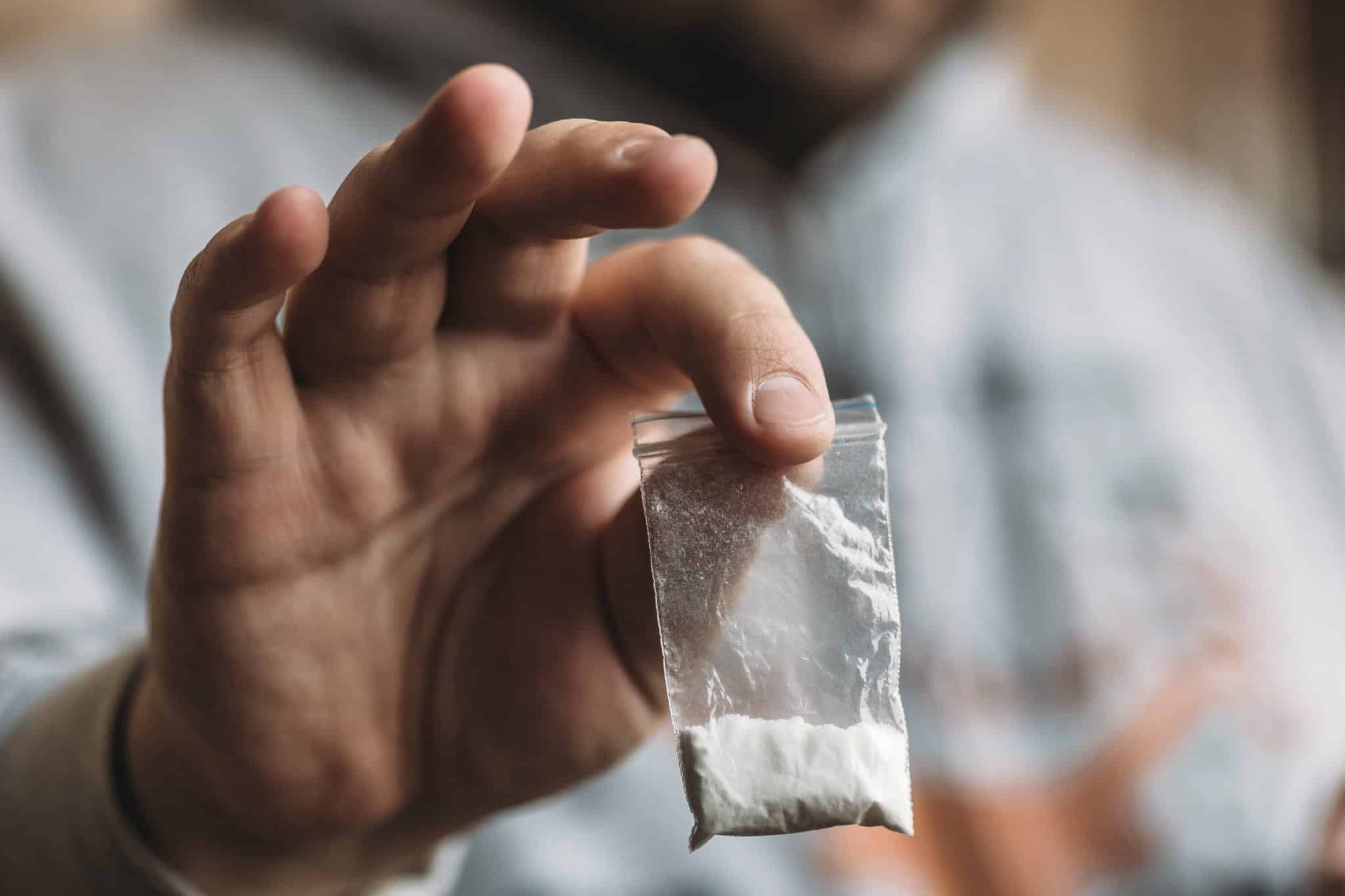There are various therapies and treatments available to people experiencing addiction to help them find relief, sustain their sobriety and improve their quality of life. One of these treatments includes an intensive outpatient program (IOP), one of many rehab options available through an addiction center. Learn more about IOPs and how they can help you or a loved one overcome addiction.
What Is an IOP?
An intensive outpatient treatment program, or IOP, is one of many programs addiction centers use to treat addiction and co-occurring mental health conditions. IOPs treat addiction that doesn’t require detox and 24/7 medical supervision. Clients who participate in these programs can return to their daily schedule when they finish treatment for the day, meaning they can go to work or school or spend time with family at home.
IOPs are sometimes a transition stage between residential treatment and reentry into sober society. Addiction centers design these programs to help clients establish a reliable support network, prevent relapse and learn healthy coping mechanisms for various triggers, cravings and uncomfortable feelings or situations.
You can also enroll in an IOP substance abuse program even if you’ve never participated in residential treatment. If you have outside responsibilities, such as your career or family commitments, other treatment options may not be feasible. Intensive drug rehab programs offer a quality alternative, and you’ll have access to many of the same treatments and therapy as those in residential care.
How Does an Intensive Outpatient Rehab Program Work?
While intensive outpatient treatment programs are flexible and don’t require you to stay overnight at the addiction facility, they’re still an intensive form of substance misuse treatment. Clients who participate in an IOP must adhere to a set schedule and maintain accountability to achieve the best results.
IOPs work in many of the same ways as other treatment programs but with a few key differences. While the care you’ll receive will vary based on the clinic you choose, the general process for seeking treatment through intensive outpatient addiction programs is as follows:
1. Assessment
Before you can begin treatment, an addiction specialist will conduct an assessment to determine the severity of your addiction and the types of treatment you need. They’ll ask questions about your history with substances, such as:
- When did you start using substances?
- How often do you use alcohol or drugs?
- What is your typical dose?
- Are you experiencing any withdrawal symptoms, and what are they?
- Are you currently under the influence of any substances?
- When do you usually use drugs or alcohol, and in what settings?
They’ll also ask questions about your personal life so they can determine the ways addiction is affecting you. They might ask about your family life, your productivity at work, your physical and mental health or if you’re experiencing financial hardship due to addiction.
Once an addiction specialist has gathered all of the necessary information, they’ll work with you to create a personalized treatment plan that suits your needs. An IOP program may be the best fit if you live in a safe and sober environment and need to return home after treatment to manage your responsibilities, such as work or child care.
2. Medication-Assisted Treatment or Other Level of Treatment
Depending on the severity of your addiction and the type of substance you’re using, you might need to go through a detox process. While a professional must monitor severe cases of withdrawal in outpatient care, less severe cases can be managed through medication-assisted treatment.
Withdrawal symptoms can often be physically and mentally uncomfortable and are one of the reasons that some people choose not to seek treatment. With medication-assisted treatment, you can feel safe and secure without worrying about experiencing some of the more intense symptoms. Medication-assisted treatment can also:
- Help you stay committed to your recovery
- Prevent a potential relapse
- Reduce withdrawal symptoms and cravings
- Reduce or remove the desire to use substances
- Help you keep up with daily responsibilities
There are various medications used in medication-assisted treatment, and a medical professional will prescribe the type that’s best suited to your needs. They’ll consider the substance you were using and other medical factors determined in your assessment. Once you start taking these medications, you should feel comfortable enough to begin official treatment.
3. Treatment
Once you’ve established your treatment plan and begun your journey through an intensive outpatient program for alcohol abuse or drug addiction, you’ll participate in various therapies. Counseling can help you manage your triggers, handle your withdrawal symptoms and learn healthy coping mechanisms to prevent relapse. Some types of treatment you might participate in include:
- Cognitive behavioral therapy (CBT), a form of talk therapy that uproots negative thinking so you can respond to situations positively
- Trauma therapy, which can help you overcome traumatic events that may have led to addiction
- Experiential therapy, a form of therapy that involves engaging activities for the body and mind, like hiking or swimming
- Holistic programming, which aims to restore balance to the mind and body through non-medicinal and standard rehabilitation methods
- Individual counseling, which narrows in on your unique needs and covers different facets of your life
- Group therapy, where you’ll share your experiences with others and lend them your support
- Family therapy, which can help everyone affected by someone’s addiction heal
During treatment, you’ll learn about the root cause of your addiction and how to handle challenges without resorting to substance use. A counselor will teach you healthy coping skills to manage your triggers and help prevent a relapse.
If you have a co-occurring mental health condition, you may also receive a dual diagnosis, meaning you’ll simultaneously receive treatment for both conditions. Mental health is one of the risk factors for addiction, but mental health issues can also arise as the result of an addiction. Treating mental health conditions alongside addiction can help you find long-term success in your recovery journey.
4. Aftercare and Relapse Prevention
Creating a plan to manage your addiction after treatment is vital to help you sustain your sobriety in the long term.
You’ll work with an addiction specialist who can help you identify your triggers and map out potential responses. For example, if you’re spending time with friends at a restaurant and they start drinking, this could be a triggering situation if you’ve struggled with alcohol misuse. One of your responses could be to leave the situation or take a moment to meditate and calm your anxious thoughts.
Your relapse prevention plan would also include a list of contacts you can call if you feel like you might start using again. These individuals can remind you why it’s important to stay dedicated to your recovery and can help distract you if necessary.
Part of your aftercare plan might include attending 12-step group therapy. These group meetings allow you to connect with others in various stages of recovery who share your experiences. You can talk openly about your challenges, ask questions or seek advice. Members of the group can help hold each other accountable and keep you dedicated to sobriety.
What Is a Typical Day-to-Day Experience for Someone in an IOP?
A typical day in an intensive outpatient addiction treatment program will look slightly different depending on what facility you’re a client of, but generally, IOPs follow the same model.
Treatment may consist of three-hour sessions three times a week. Most people spend about four to six weeks in therapy to learn how to maintain their sobriety once they complete official treatment.
A typical day in an intensive treatment program will occur at the treatment facility. You’ll likely start in group therapy led by a counselor to discuss the issues you might face in recovery with others experiencing similar challenges. Groups will either be specific and target one concern, while others might be more general and include people with various kinds of addiction.
Once you complete group therapy for the day, you might move to individual counseling. Each person will attend a different counseling session based on their unique treatment plan.
Individuals often feel more comfortable sharing their experiences one-on-one rather than in a big group, especially at the beginning of the process. Counselors can also focus on one individual at a time and address the specific needs of the client. Individual therapy is where you’ll get to the root cause of your addiction and create goals for your recovery.
While each type of counseling serves a unique purpose, you’ll learn many of the same coping skills as others in treatment.
Coping skills, such as meditation or yoga, can help you manage uncomfortable situations that might be triggering your addiction and causing cravings. When you experience a trigger or craving, you’ll turn to one of your learned coping mechanisms to help you through rather than turning to substances and relapsing.
At the end of individual therapy, the three-hour session is complete. You’ll have the option of attending additional group meetings if the treatment center offers these. You can also return home, go to work or participate in other activities beneficial to your recovery, such as healthy recreational activities.
Why Intensive Outpatient Addiction Programs Might Be Right for You
Many levels of care exist at an addiction facility, and you might not be sure which is suited to your needs. An intensive outpatient program might be right for you if you have:
- A safe and sober living environment: People often choose residential care because they have family or friends at home who use alcohol or drugs. However, if you live in a sober environment with ample support, an intensive outpatient addiction program can be an excellent choice. At the end of treatment each day, you’ll be able to return home to your family and relax in a comfortable and familiar environment.
- Outside responsibilities: Many people choose intensive outpatient treatment because they have various responsibilities to keep up with, such as work, education or family care. For example, if you work during the day, you can attend treatment at the addiction facility in the afternoons or evenings, allowing you to continue to provide for yourself and your family members.
- Completed residential care: Some people use intensive outpatient programs to transition from residential care. Rather than transitioning straight to independent living, and intensive outpatient addiction program can help you continue to address your challenges with addiction while you start attending work or school and connecting with friends or family again. You’ll continue to build on the skills you learned during other treatment methods and develop a deeper understanding of the root causes of your addiction.
- The ability to commit to program requirements: You’ll need to balance your responsibilities with the time you put toward an IOP. Your therapists and addiction treatment specialists will be there to support you and teach you how to get the most out of your program. You just need to dedicate the time each week to attend rehabilitation.
- Limited insurance coverage: Residential care can have many overhead costs if your insurance doesn’t cover the expenses since you’d be staying at the facility overnight for anywhere between 30 to 90 days. Intensive outpatient rehab offers many of the same treatments but often at a reduced price, as you’ll be returning home at the end of each day.
An addiction specialist can help you determine if an IOP is right for you. During the assessment stage, they’ll consider various factors, such as the severity of your addiction, home environment, potential withdrawal symptoms and outside responsibilities. If you’re a good fit for an IOP, you’ll work with an addiction specialist to curate a treatment plan that suits your needs.
Seek Treatment With Our Intensive Outpatient Program
If you’re experiencing addiction, you’re not alone. Crest View Recovery Center in North Carolina strives to help each one of our clients overcome addiction and improve their lives. We understand that some of our clients have responsibilities outside of treatment, so we’ve created our intensive outpatient program to help you overcome addiction and stay committed to your career and family.
Our intensive outpatient rehab program can help you break free from the physical and psychological dependence on substances through various therapies and treatments. We utilize evidence-based clinical practices alongside holistic therapies to help you get results. Once you’ve completed treatment with us, you’ll have access to our alumni program so you can stay in touch with others from the program and our facility.
If you’re ready to take the first step toward a sober, healthy lifestyle, call (866) 327-2505 or contact us today to learn more about our programs and speak with a specialist.








